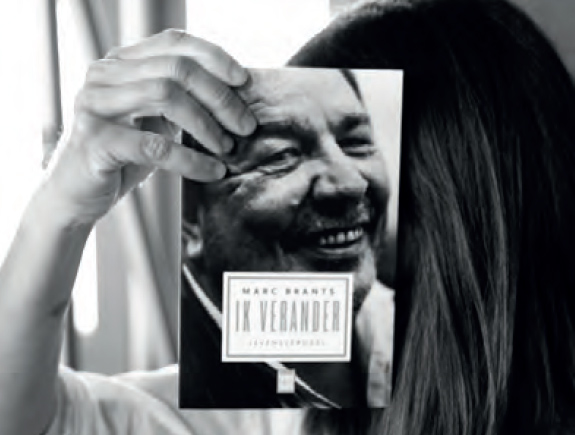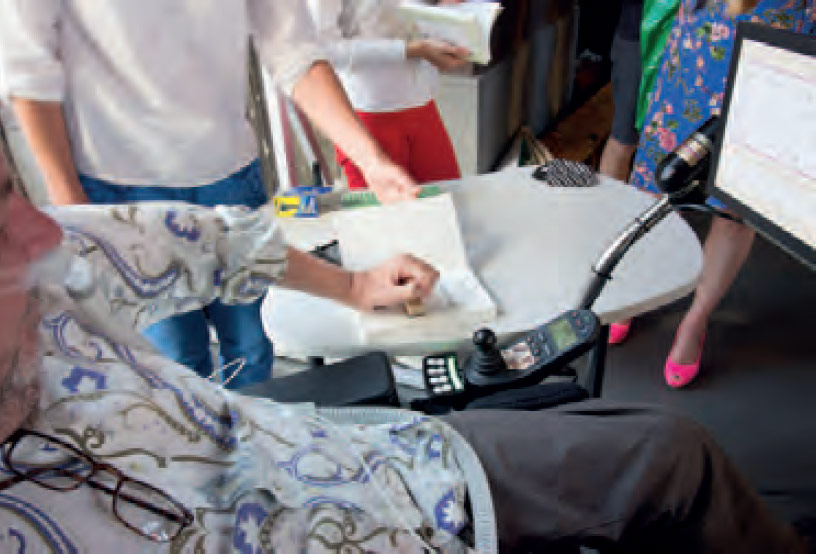Marc Brants
Marc Brants has written the book 'Ik verander (I change)'
 Following the publication of his book ‘I change’, we spoke to author and ALS patient Marc Brants.
Following the publication of his book ‘I change’, we spoke to author and ALS patient Marc Brants.
Artist of life
Marc, you describe yourself as an artist of life. What is your stance on life?
It is a description I borrowed from friends who used it to describe my personality. I enjoy life to the fullest. Looking, feeling, smelling, hearing, tasting, it all stimulates me to become. We have senses (systems of perceiving stimuli) and a brain to act on what we perceive. Delightfully interesting, right? If you consider that everyone deals with sensory stimuli in a different manner, you’re faced with a captivating world, an endless source of desire and growth. For me, that’s life. My deteriorating body is an instrument I need to survive and to channel and convey everything I think and feel.
From blog to book
Writing obviously runs in your blood. What made you write a book? Is it a logical extension of your blog?
Several months before I was diagnosed with ALS, when I felt my body deteriorating, I often looked back on my life. I have a rich past, but found few tangible things. I wondered whether my life had contributed anything to others. So I started writing a blog, and immediately turned it into a bigger project. I wanted to create a pass along book, a box of inspiration, something you could buy, take something from it, add something personal to it and then pass it along to others. I was looking for a sort of endless existence, a never-ending transfer of inspiration. When I asked my good friend, Freya Piryns, to lead the project, she answered: “But you don’t pass along a book, you cherish it. And with this blog, you’ve essentially written a book.” She went looking for a publisher and I continued writing on my blog and on an essay on change. Friday Publishers soon committed itself to the book. And that was that.
Editor’s note: you can find Marc’s blog at http://marcbrants.blogspot.be/
The book ‘I change’
Without spoiling it for the reader, what is the book about? Where did you find your inspiration for it?
I wanted to write the essay ‘I change’, which is the beginning of the book, after a conversation I had with Roel Verniers. Roel was the father of two children at the school of which I was the head teacher. He had cancer and was telling me about his ideas on change management, my pet subject. His experience with his disease added a human dimension to it. He wanted to write a book about it, but, unfortunately, the cancer prevented him from doing so. His wife Clara, together with their children AnaÏs and Wolf, then completed Roel’s project with the book and the accompanying theatre performance Some things (fall through), published by Friday Publishers as well. In my essay, I give my own human dimension to change. ‘I change’ is about how I am changing in a world I want to change, a battle of life and dead. The title refers to that double interpretation. The rest of the book is a slice of life, based on my blog.
Have you ever experienced writer’s block whilst writing this book?
You can read about that in the book. Clichés are founded on repetitive experiences.
Being an ALS patient whilst writing a book no doubt posed additional challenges. Did you have to use any aids? Did it stir up a lot of emotions?
In the book, you experience the evolution of an ALS patient over time. I began writing at a rapid pace, my fingers furiously tapping the keys. The loss of strength made me deal more efficiently with written language. The essay and the final part of the book were written together with Lucy. Because I started writing my story before I was diagnosed with ALS, you can actually follow the rollercoaster of emotions. The anger, the fear, the laughter and the crying are all real.

Politician Freya Piryns wrote the introduction of your book. How did you meet her?
Freke is one of my ‘dearest people’. I met her in 1999. Elections were on the way and Freya was organising an election debate at the teacher training college. She believed her fellow students weren’t sufficiently interested in the parties’ election manifestos. I participated in the VU-ID debate. I wasn’t able to convince her politically, I was too taken aback by her purity, her drive, her quick thinking and her good-naturedness. During the book launch Freya explained how we met.
Allow me to quote Freya:
“Let me take you to Professor Barabas’ time machine and transport us back to 1999. That is the year Marc and I ran into each other in the staffroom at De Pijl, just a few metres from here. (We had met each other before this, but for this meeting I would like to refer you to the introduction of the book. I’m trying to avoid telling everything twice.) To give you an idea of how long ago the year 1999 truly is: we still used Belgian francs, a purple green government was just in power, the people on the tram still looked at each other, instead of being glued to their mobile devices. Nobody had yet heard of Facebook or Twitter. The Lisp in Lier still had a champion team, and on the playground of De Pijl played an 11-year old boy, with whom Marc would kick a ball about now and then and whom he foresaw would have a great future: Radja Nainggolan, the current emperor of Rome. I was in my final year at the teacher training college at Lier and had my internship at De Pijl. Marc would take me along with his inexhaustible energy, and with his infectious enthusiasm we all know, which is visible in every page of this book. We weren’t on the same page politically, but that wasn’t a problem – I have other special relationships with people with different political beliefs, as you may well know. Later, when I got a job at De Pijl, my friendship with Marc developed, and I would run into Marc outside of school hours, sometimes even with him wearing his yellow-black scarf at the stadium of Lierse, where no gambling Chinese had yet been seen. I won’t start singing now, I’ll spare you of that, but we did sing along with the club song: ‘Yellow and black are our colours / Lierse is our name / No one shall disgrace our banner / Too great is our fame’. That’s to say, ladies and gentlemen, we did have some laughs.
Editor’s note: ‘Ik verander’ was published by Friday Publishers and is available as paperback or e-book at Standaard Boekhandel, Bol.com and other bookshops.
More information:
- https://als.be/en/Library
- ikverandermarcbrants.wordpress.com
Translate: Katia Ombelets
Source: ALS Liga-magazine 169 – July, August, September 2015


